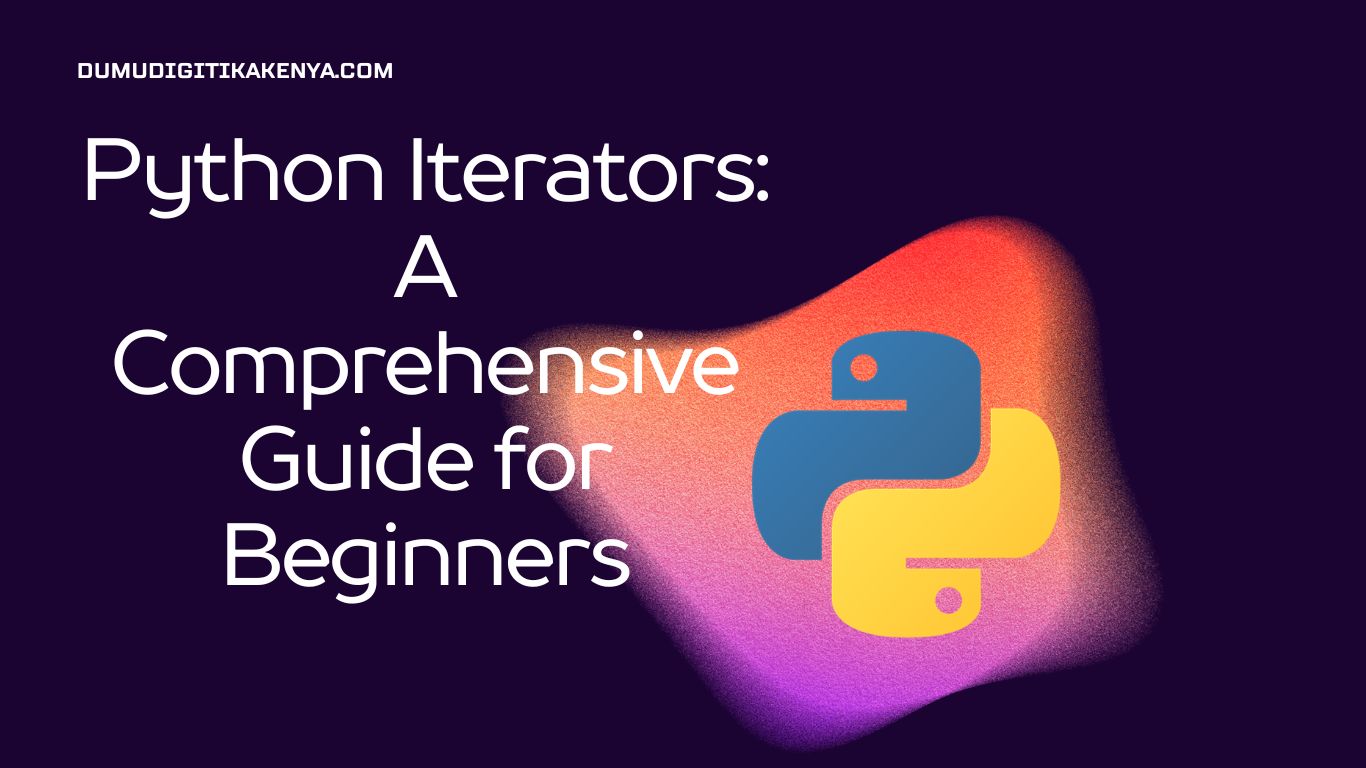Python Iterators: A Comprehensive Guide for Beginners
In the dynamic realm of programming, where efficiency and versatility reign supreme, Python stands out as a leading language for both beginners and seasoned developers alike. One fundamental concept that empowers Python’s prowess is the use of iterators, a versatile tool that allows programmers to traverse through data structures with grace and precision. In this comprehensive guide, we will unravel the intricacies of Python iterators, focusing on their essential role in simplifying repetitive tasks and enhancing code readability. By the end of this tutorial, you will have a firm grasp of Python iterators, their applications, and how to create custom iterators tailored to your specific needs. So, let’s embark on a journey to master the art of iteration in Python, as we explore the world of Python Iterators.
Python iterators, as the backbone of many Python constructs like loops and comprehensions, provide a seamless means of accessing elements within data collections. We will begin by delving into the foundational principles of iterators, understanding how they operate under the hood, and why they are indispensable in Python programming. Through hands-on examples and clear explanations, you will learn how to navigate Python lists effortlessly and gain confidence in handling various data structures efficiently.
Furthermore, we will unlock the power of custom iterators, a skill every Python developer should possess. You will be guided through creating your own iterators, tailored to your unique requirements, whether it’s generating sequences of numbers or accessing elements from custom data structures. We’ll also explore the built-in iter() and next() functions, demystifying their roles in the iterator ecosystem. Finally, we will venture into the intriguing realm of infinite iterators, demonstrating how Python enables you to work with endless sequences of data.
In essence, this tutorial will equip you with the essential knowledge and skills needed to harness the full potential of Python iterators, making you a more proficient and effective Python programmer. So, let’s embark on this enlightening journey into the world of Python Iterators and unlock new avenues for coding efficiency and elegance.

Table of Contents
1. What is an Iterator?
An iterator in Python is an object that represents a sequence of data. It allows you to loop through elements of a container (like a list, tuple, or dictionary) one at a time, without the need to load the entire data set into memory. In Python, iterators are widely used, and they play a crucial role in for loops, comprehensions, and other looping constructs.
2. Iterating through Python Lists
Let’s start with a basic example of how to use an iterator to loop through a list. In Python, you can easily iterate through a list using a for loop. Here’s a sample code:
fruits = ["apple", "banana", "cherry"]
for fruit in fruits:
print(fruit)Output:
apple
banana
cherryIn this code, we have created a list fruits and used a for loop to iterate through its elements one by one. The fruit variable takes on the value of each element in the list during each iteration of the loop.
3. Creating Custom Iterators
You can also create custom iterators in Python by defining a class with two methods: __iter__() and __next__().
Here’s an example of a simple custom iterator that generates numbers from 1 to 5:
class MyIterator:
def __init__(self):
self.num = 0
def __iter__(self):
return self
def __next__(self):
self.num += 1
if self.num <= 5:
return self.num
else:
raise StopIteration
my_iterator = MyIterator()
for num in my_iterator:
print(num)Output:
1
2
3
4
5In this code, we have defined a custom iterator MyIterator that generates numbers from 1 to 5. The __iter__() method returns the iterator object itself, and __next__() method defines how to generate the next value. When there are no more items to return, a StopIteration exception is raised.
4. Using the iter() and next() Functions
Python provides two built-in functions, iter() and next(), that can be used to work with iterators.
iter(): This function returns an iterator object from an iterable (e.g., list, tuple, or custom iterator).next(): This function retrieves the next item from an iterator.
Here’s an example using these functions:
numbers = [1, 2, 3, 4, 5]
num_iterator = iter(numbers)
print(next(num_iterator)) # Output: 1
print(next(num_iterator)) # Output: 2
print(next(num_iterator)) # Output: 3In this code, we create an iterator num_iterator from the numbers list and use next() to retrieve the next item in the iterator sequence.
5. Working with Infinite Iterators
Python also allows you to work with infinite iterators. These are iterators that continue indefinitely. A common example of an infinite iterator is the itertools.count() function.
Here’s an example:
import itertools
count_iterator = itertools.count(start=1, step=2)
for _ in range(5):
print(next(count_iterator))Output:
1
3
5
7
9In this code, we use itertools.count() to create an infinite iterator that generates numbers starting from 1 with a step of 2. We use next() to retrieve the next values from the iterator.
Conclusion
In conclusion, mastering Python iterators is an essential skill that opens up a world of possibilities in your Python programming journey. With a solid grasp of the fundamental concepts covered in this guide, you are now well-equipped to streamline your code, enhance your program’s efficiency, and make your Python scripts more readable and elegant. Python iterators are not just a tool; they are a key to unlocking your potential as a Python developer.
As you continue your programming journey, remember that practice is key to mastery. Experiment with different types of iterators, explore advanced concepts like generator functions, and apply your newfound knowledge to real-world projects. Python iterators are a fundamental building block in the language, and your proficiency in using them will undoubtedly set you on the path to becoming a proficient Python programmer.
So, whether you’re a novice coder taking your first steps into the world of Python or an experienced developer looking to refine your skills, the knowledge of Python iterators is a valuable asset. Embrace the power of iteration, harness the elegance of Python, and let Python Iterators be your guiding light towards more efficient and elegant code. Happy coding!




